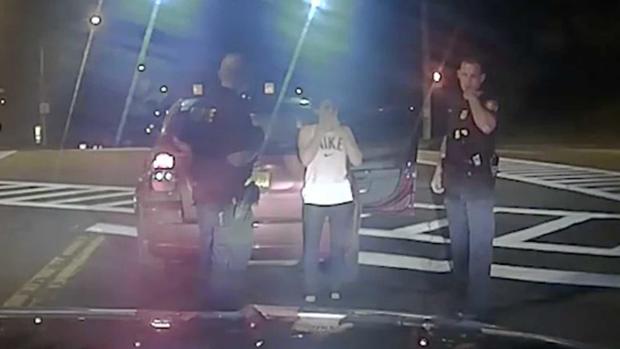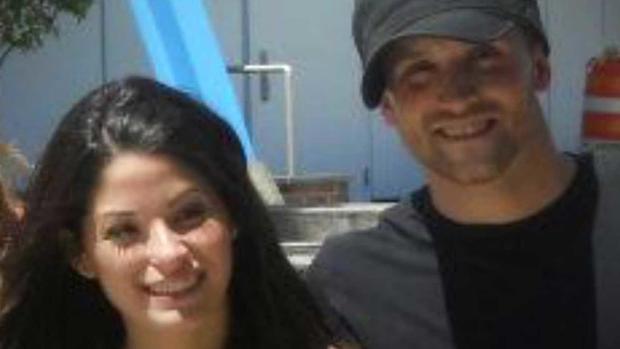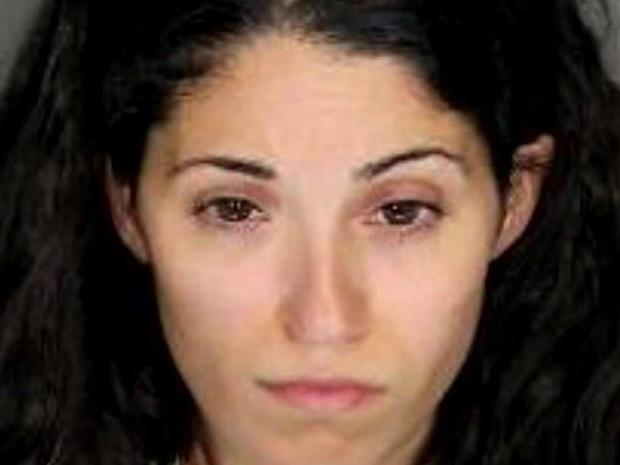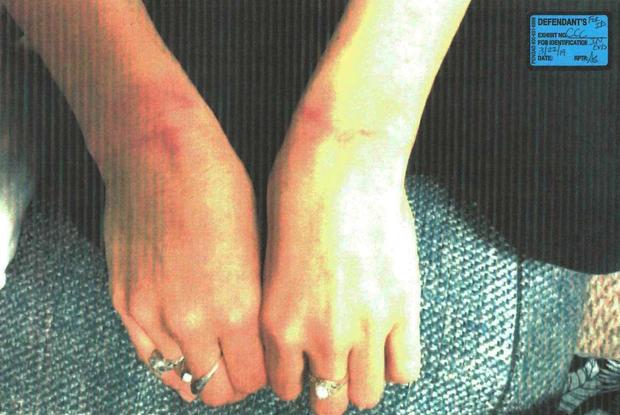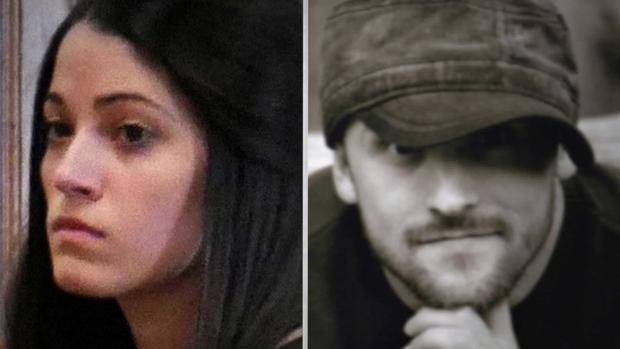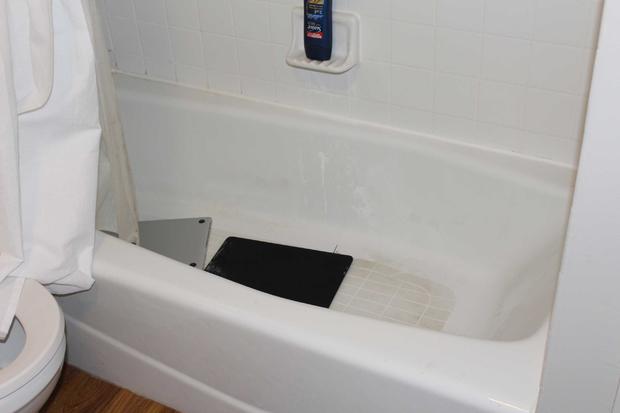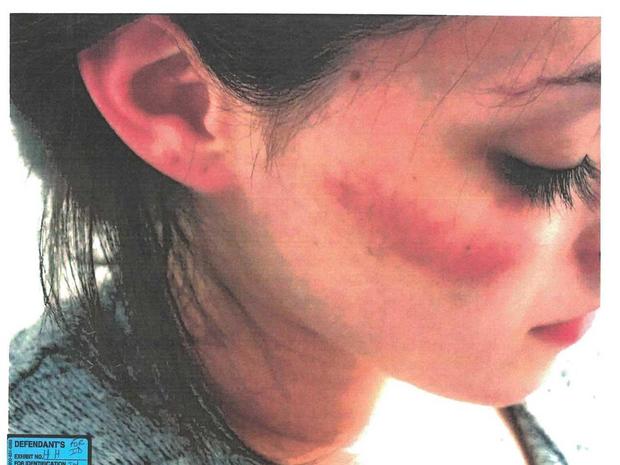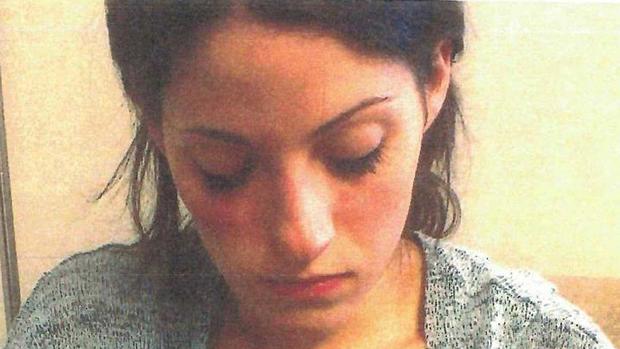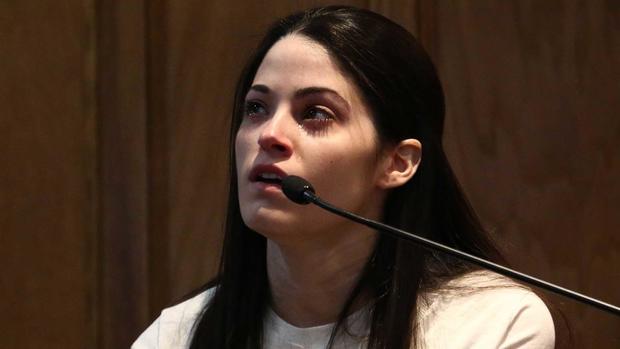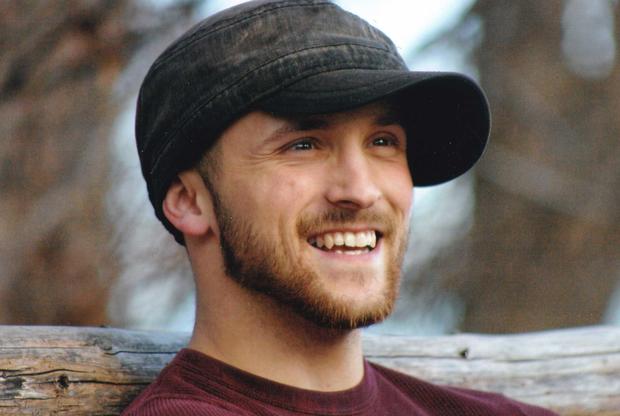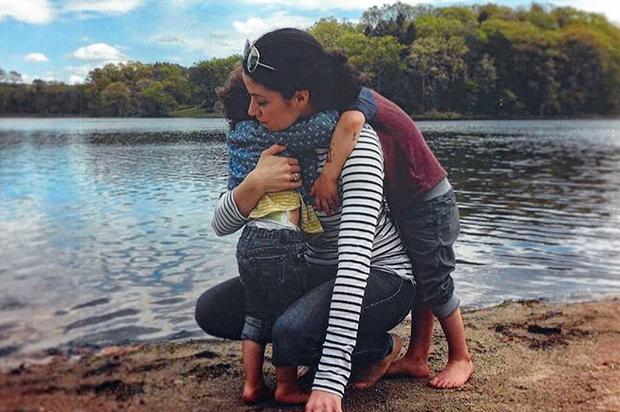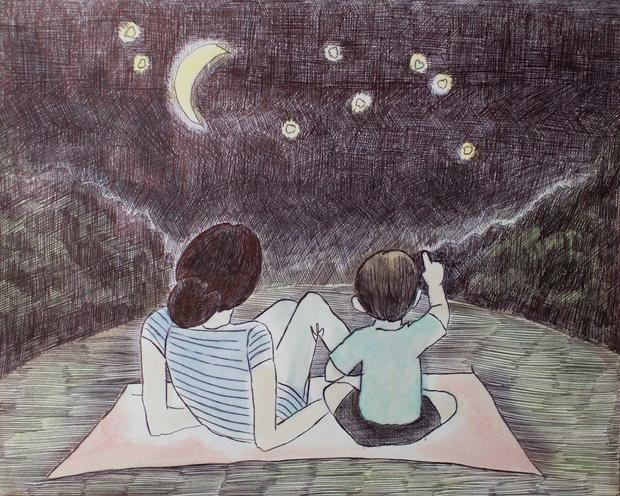Self-defense or murder? Shooting death divides a community
[This story first aired on November 21, 2020. It was updated on August 7, 2021.]
To some, Nicole "Nikki" Addimando is a young mother who shot her abusive partner in self-defense when she feared he would take her life. To others, she is a murderer who took the life of Chris Grover, a father and popular gymnastics coach in Poughkeepsie, N.Y.
The death of Chris and the legal proceedings against Nikki have divided the community, and hinge on the question of whether Nikki murdered Chris or whether she was, as she argues, acting in self-defense against an abusive partner.
NIKKI AND CHRIS
At 2 a.m. on September 28, 2017, Police Officer Richard Sisilli encountered a car stopped at a red light. The light turned green, and when the car didn't move, Officer Sisilli says he tooted an airhorn to get the driver's attention. What happened next stunned him.
An agitated young mother named Nicole Addimando, in stocking feet, told him something had gone terribly wrong at home.
OFFICER RICHARD SISILLI [dashcam video]: You need to relax, OK. Just take a few deep breaths.
NIKKI ADDIMANDO: He's laying on the couch, he's just laying there …
She said she'd been abused, had tried to leave … and her boyfriend had a gun.
NIKKI ADDIMANDO: He said if you leave I'll kill you…I picked it up and he said you wouldn't do it…and… oh my god, oh my god …
Putnam County Chief Assistant District Attorney Chana Krauss would soon be investigating Nikki's story.
Chana Krauss: Police Officer Sisilli, I think, is in shock that this is unfolding before him. … He doesn't know if there's an ambulance that's necessary. … There are two children in the car.
Nikki had called a friend. Seen on the police dashcam video, the friend, Elizabeth Clifton. pulls up and officers ask her to wait in a nearby parking lot.
Elizabeth Clifton: I watched all these vehicles go by. Police emergency vehicles going by.
Elizabeth Clifton: And at some point I saw that the ambulance went back the other way, and it didn't have its lights on. So, I was afraid … I was afraid of what had happened.
The officers went to Nikki's apartment and found her partner Chris Grover, who appeared to be sleeping on the couch, dead, with a single gunshot to the head. They found the shower running and a broken laptop in the bathtub.
They brought Nikki to the police station, where she was interrogated by detectives, and Elizabeth learned Chris was dead.
Elizabeth Clifton: I never in a million years had a fear that he would die. I was afraid she would die every day.
Not long afterward, Gail Grover got a heartbreaking visit from the sheriff.
Gail Grover | Chris's mother: He told us that Chris had passed. And my first question was, "are Nikki and the kids OK?" That right there tells you we had no clue.
No clue, says Gail, that anything was amiss in her son's life. She describes Chris as kind and athletic. He had a black belt in Taekwondo and was head gymnastics coach at Mr. Todd's Gym in Poughkeepsie. Beth Whalen coached with him there.
Beth Whalen: He was always so happy and … full of energy, I mean, he was like a rocket running around the gym. … he was a huge kid at heart. Huge kid.
And that's where, in 2008, he met a pretty young coach named Nicole Addimando. He was 21, she was 19. Soon they began dating. The couple didn't marry, but in 2012, they moved in together and announced Nikki was expecting their first child, son Ben.
Jericka Duncan | "CBS This Morning" national correspondent: Was he excited about being a dad?
Gail Grover: Absolutely ecstatic. … He was a proud papa.
Chris, a talented amateur videographer, made a video for Nikki, which he called: Becoming Mom. Two years later, daughter Faye came along.
Gail Grover: Those kids were everything to him.
And to Nikki, too. Gail says Nikki was an excellent mom. Elizabeth Clifton taught a Mommy and Me music class Nikki attended with Ben.
Elizabeth Clifton: One time she came to class with what looked to me like a black eye. … she covered herself completely. … and even in the summer, she'd be wearing long sleeves, long pants, have a scarf covering around her neck.
Nikki's childhood friends Laura Mocodeanu and Rachel Hawkes also noticed injuries, but didn't press her.
Laura Mocodeanu: I would notice a bruise, you know, but … she would often say, you know, "Oh, I was playing with Ben and I got hit by his guitar." You know? It was always something that, to me, at the time seemed very –
Rachel Hawkes: It was plausible.
Laura Mocodeanu: -- plausible, um … I didn't think twice about it.
Then, one day, a mom from the gym where Chris coached heard about Nikki's injuries. She'd seen Chris lose his temper in the past with young gymnasts in his class. Concerned, she made an anonymous report to Child Protective Services, or CPS. As required by law, CPS visited Nikki and Chris's apartment. Before long, Chris was dead, and Nikki was trying to explain why.
NIKKI ADDIMANDO [police questioning]: He faced me and then he looked up for a second and I … shot him.
Chana Krauss: I think she thought she got them to believe that she had acted out in self-defense, as opposed to intentionally killed Chris Grover.
NIKKI ADDIMANDO [police questioning]: It's like, obviously self-defense, right?
Chana Krauss: I think she thought she was going home that night.
DET. HONKALA: Alright so, obviously this is a, you know, a serious situation …
But Nikki did not go home that night. Instead, she was charged with second-degree murder in Chris's death.
Jericka Duncan: What did you think when they charged Nikki with murder?
Elizabeth Clifton: I was heartbroken.
KILL OR BE KILLED?
A few weeks after Chris Grover's death, friends, family and former students, like Mikayla Hughes, gathered to release balloons in his honor.
Mikayla Hughes: He always said, "Let's go kid…" And it felt really nice to know that, like, I wasn't alone, and we all were feeling the same thing.
Supporters of Nikki Addimando were reeling, too. Her arrest for Chris's murder prompted an outcry from friends, family and advocates for victims of domestic violence.
ELIZABETH CLIFTON [speaking at vigil for Nikki]: For choosing to defend herself and survive, Nikki may spend the next 20 years to life in prison.
Elizabeth Clifton began organizing rallies and fundraisers, and also reliving the years of terror she says she went through with Nikki beginning in April 2016, when she decided to confront Nikki about her injuries.
Elizabeth Clifton: And I said to her that I'm really … scared for you, and I -- I'm worried that you're not safe at home.
Elizabeth says Nikki reluctantly admitted her partner Chris was abusing her.
Elizabeth Clifton: … it wasn't like floodgates. I would say a slight trickle of acknowledging that, yes, this was happening … feeling so scared.
Rachel Louise Snyder: Nikki's case stood out to me … because of the level of violence that was involved.
Rachel Louise Snyder is a journalist who spent 10 years studying domestic violence for a book called "No Visible Bruises." As part of her research on Nikki's case for a New Yorker article, she read the full court record and interviewed dozens of people. She says Nikki alleged Chris forced himself on her sexually but didn't become violent until after son Ben was born.
Rachel Louise Snyder: And he slammed her head into the doorframe of Ben's room and then raped her.
It happened again, said Nikki, almost two years later, when she was pregnant with Faye. She sought medical attention at Vassar Brothers Hospital in Poughkeepsie.
Rachel Louise Snyder: And a couple of days later … she was standing in the kitchen making eggs for Ben. And Chris allegedly came in and said, "You better be making some for me." And she said, "Yes, sir!" pretty sarcastically. He forced her to the ground, and took a spoon, and held it into the -- gas flame, and burned her all over her body with it.
Again, Nikki sought medical attention. The report from the exam states assailant named Chris "heated up a metal utensil on the gas stove"… and burned Nikki … "in multiple areas of her body."
Elizabeth Clifton: He was, as far as I understand … tying her up … I remember seeing the marks around her neck and wrists. … what he was doing was raping her.
Nikki feared Chris was videotaping the encounters. Elizabeth says she and Nikki's therapist pushed Nikki to press charges.
Rachel Louise Snyder: Multiple people, in fact, tried to get her to file police reports, and she was just petrified. She said that Chris would tell her that nobody would believe her. And she doesn't want her kids taken away from her. She knew she was in danger.
Elizabeth tried to help Nikki leave, and in the summer of 2016, Nikki did pack the kids in the car and drive over to Elizabeth's house.
Elizabeth Clifton: One of the hardest things I've ever experienced is that she would come and she'd drive and she'd slow down … and then, and then go again.
Rachel Louise Snyder: She saw Nikki drive past her house over and over again for hours, and she was on the phone saying, "Just come in. Just come in the front door," and Nikki just couldn't do it. And that's what a domestic violence victim leaving looks like. It looks like a series of false starts. In this mindset, her terror of him is stronger than her belief that the system will save her.
In the months before Chris died, Nikki sought medical help three times from a midwife who noted multiple injuries.
In May, "rope-like burns"… states Chris has a gun and uses it "in my body."
In June, "vulva" … "swollen" … looks "inside out."
In August, "bruised and bleeding" … "Chris at gunpoint raped her."
Then, in September, came that anonymous call to Child Protective Services.
Rachel Louise Snyder: CPS … called Nikki and Chris and said, "We're gonna come by and interview you tomorrow. … suddenly there were outside eyes on them.
Nikki said Chris left the house that day with a bag full of evidence of abuse, presumably to get rid of it. The next day, CPS conducted its home visit. Afterwards, Chris went to work, and came home that night in a quiet mood. At one point, Nikki said he called her into the bedroom, where he was loading his gun.
Rachel Louise Snyder: And he wants her to try to load it. And he gives her a bullet and apparently, she's shaking.
According to Nikki, she later took a shower. And at some point, Chris threw the laptop in the tub. She said he forced her to have sex with him on the couch but was unusually gentle.
Rachel Louise Snyder: And if you are a domestic violence victim and … someone who is usually … very violent with you is suddenly gentle, you're gonna get that message. You're gonna understand immediately that that is a goodbye.
Nikki said she lay for a while on top of Chris, and believed he was asleep. When she tried to get up, he pulled the gun from behind the couch cushions. Nikki said she got the gun away and pointed it at him.
Rachel Louise Snyder: She said he laughed at her, and then he said, "Here's what's gonna happen. You're gonna give me the gun and I'm gonna kill you, and then I'm gonna kill myself, and the kids are gonna have no one." And she said she just lunged and shot -- shot him in the head.
Nikki's supporters say her choice that night was simple: either kill or be killed.
A LOOK AT THE EVIDENCE
In March 2019, Nikki Addimando, out on bail at the time, went on trial for the murder of her partner Chris Grover. Friends and advocates, wearing purple, the color for victims of domestic violence, lined up in support.
They stood side by side with loyal Chris supporters, heartbroken to learn Nikki's defense would hinge on allegations that he abused her.
Jericka Duncan: What do you want people to know?
Gail Grover: Chris didn't do this. I think she was looking for attention, and she got it. My son never hurt anybody. And that's the bottom line.
Video cameras were not allowed inside the courtroom at the Dutchess County Courthouse in Poughkeepsie. Prosecutors argued that Nikki painted herself as a victim, but her allegations of abuse were untrue.
Chana Krauss: She was not the victim in this case. Chris was the victim in this case. And that became very, very apparent.
Prosecutor Chana Krauss has spent much of her career advocating for victims of sexual violence.
Krauss told jurors the physical evidence was overwhelming – starting with the fact that Chris was killed with a direct contact wound to the head.
Chana Krauss: The medical examiner testified that -- the muzzle of the gun that was imprinted in Chris's head meant it … was embedded in his head when she … pulled the trigger.
Krauss said Nikki – not Chris – threw the laptop in the tub in an attempt to make it look like Chris had evidence to hide.
Chana Krauss: She didn't expect the laptop to be recovered in a way that we could still examine it and determine that there was absolutely no evidence of abuse on that laptop.
And Krauss presented a series of texts Nikki sent Chris just days before he died, calling him an "asshole manchild" and asking "WTF is wrong with you?" "Are you this stupid?"
Chana Krauss: She was the one who was abusing him in these messages when they communicated throughout the day.
Then there were internet searches on Chris's phone the night he died. Krauss believes Nikki made them.
Chana Krauss: "If you shoot someone in their sleep, will the police know?" … Fifteen minutes of searches … that are a roadmap to exactly how he was murdered.
Even more damning was a text Nikki sent a friend six weeks earlier.
Chana Krauss [reading text]: "I haven't figured out a way to kill him without being caught, so I'm still here."
Nikki punctuated the text with a grimace emoji, which her lawyers say clearly shows she was joking.
Chana Krauss: Yet, several weeks later, he was dead. So that's quite a coincidence.
Krauss acknowledges Nikki had a traumatic experience when she was 5 years old. Nikki was raped on a sleepover at a friend's house. The rape was witnessed by another child. Nikki didn't tell anyone at the time, but her friends say it had a lasting impact.
Laura Mocodeanu: ... so, if we wanted to have sleepovers with Nikki we would always go and sleep at her home. She never, ever slept at one of our houses.
Nikki said the assault made her uncomfortable with sex as an adult, which she confided to Chris when they began dating.
Chana Krauss: For about a year, they didn't become intimate because he cared so much about her. And that was who he was. He never changed.
Chris didn't change, says Krauss, but Nikki grew into someone who invented stories of abuse. She never reported these allegations to police, but the stories spilled out over the years to friends and therapists. Krauss told the jurors these accusations began before Nikki met Chris, when she accused an ex-boyfriend of assaulting her.
Chana Krauss: What are they gonna think, if she alleges every relationship she ever had was non-consensual, would they believe what she said about Chris?
A few years after she began dating Chris nearly a decade ago, Nikki told a therapist that a maintenance worker at her mother's apartment complex raped her. Nikki later said her memories of the time were unclear, and she wasn't sure which abuse was by the maintenance worker or Chris.
Chana Krauss: How do you not… remember which abuse was by the maintenance worker and which abuse was by your partner? The jury would have to think, "is this true?"
Around the same time, Nikki met a married police officer who invited her to become a live-in babysitter with his family.
Chana Krauss: He was the parent of a child who was coached by the defendant and at one point -- Chris Grover as well.
Krauss says they began a relationship that lasted several years, including after Nikki lived with Chris and was pregnant with Ben. Nikki said the married police officer also forced himself on her sexually.
Gail Grover: There were so many other men, so which one was she talking about?
Nikki's supporters insist these aren't false allegations – they are true. And author Rachel Louise Snyder says child victims of assault often grow up to become victims again.
Rachel Louise Snyder: The fact that Nikki was assaulted when she was 5 years old means that -- as an adult she's put into a much higher risk category. … In fact, it would make her two-thirds more likely to be victimized as an adult.
But Prosecutor Krauss told the jurors that in Nikki's case, there is proof her allegations were false, and that her injuries often had an innocent explanation.
Gail Grover: The bruise on the eye was from Ben hitting her in the eye with a guitar. It's not rocket science. It was witnessed to seeing Ben hit her with it.
The medical records weren't clear-cut either, according to Krauss, including that first visit Nikki paid to the hospital when she was pregnant with Faye and was asked a series of questions to which she answered "no."
Chana Krauss: Is abuse inflicted with tools? "No." All right, do you have burns, or does he burn you? "No."
Krauss says it wasn't until Nikki returned a few days later that a nurse noted those burns.
Jericka Duncan: So, what do you think that means?
Chana Krauss: I think she decided to go back a second time and be able to answer, "yes" to every single one of those questions.
Chana Krauss: … what she was saying was happening was completely inconsistent with the evidence we were finding as our investigation went on.
And so, Nikki faced a huge risk that day when CPS came calling, says Krauss – her inventions of abuse would be exposed. To Krauss, that was Nikki's motive for murder.
Chana Krauss: She was concerned that Child Protective Services would know this -- manipulated history that she put out there was not truthful, and that she might lose her children.
When seen in this light, Krauss argued, Nikki's story of what happened the night Chris died quickly unravels. The pretty young mother eliciting sympathy was never what she seemed.
Chana Krauss: I think people need to understand what really happened here.
Jericka Duncan: And what really happened here?
Chana Krauss: Chris Grover was asleep when she killed him. That's what happened here.
NIKKI TAKES THE STAND
It was time for attorneys Jon Ingrassia and Ben Ostrer to present the defense case in Nikki Addimando's murder trial. They say she lived in constant danger and believed she would die the night Chris Grover died.
John Ingrassia: You have a woman with no prior history of violence. No prior criminal history at all.
Ben Ostrer: We know, that too often … women who have sought help, end up in a body bag. … That was what she was confronted with on that evening.
That's what they would need to convince a jury: that Nikki acted in self-defense, to save her own life. So, they called witnesses to corroborate Nikki's claim that she was brutally abused by Chris for years.
Ben Ostrer: There were … psychologists, nurse midwives who were fearful of the abuse that Nikki was undergoing. There was -- a police officer testified at our trial. He was ready to send police officers … to effect an arrest.
They produced photos documenting Nikki's injuries and argued that Nikki's wounds could not have been self-inflicted.
Ben Ostrer: Burns to the face to the point of leaving a blister. Burns to the breast.
Rachel Louise Snyder: She had bitemarks on … her shoulder blades. You can't reach your own shoulder blades.
Jericka Duncan: What about the bite marks on her neck, on her back, places that she couldn't reach?
Chana Krauss: How do you know if any of those injuries actually came … from Chris and not one of the other individuals that she was claiming she was involved in a relationship with?
But Nikki's lawyers say the other men brought up by the prosecution were an attempt to create confusion, and that Nikki hadn't had sexual relations with anyone but Chris for years before his death.
Ben Ostrer: So that kind of fog that they created-- was shaming Nikki, in a way.
John Ingrassia: And it's not relevant to the case of whether Mr. Grover was victimizing her with intimate partner violence.
They insisted the aggressive texts Nikki sent Chris were ways to stick up for herself, and said she paid for them afterwards when Chris hit her.
John Ingrassia: It's not uncommon for people to use words to fight back.
The lawyers reminded the jurors that the internet searches about how to kill someone who is sleeping -- they were made on Chris' phone, with no evidence that Nikki made them. And the medical examiner testified there was no proof Chris was sleeping.
Ben Ostrer: Doctor Newman said it could have happened exactly the way Nikki said it happened.
They called Nikki herself to the stand, so the jurors could hear from her directly.
Jericka Duncan: What did you tell her day one, day two?
John Ingrassia: … to tell the truth. Just to tell the truth. … The truth never changes. … And Nikki's story did not change.
Visibly shaken and sometimes in tears, Nikki told the court that Chris lashed out when he felt disrespected, beat her, raped her, choked her, and left her tied up for hours.
For Laura Mocodeanu, watching her friend tesify was heartbreaking.
Laura Mocodeanu: It was … three full days of her up there being interrogated and have to relive the trauma that she experienced.
Nikki told the jurors that after Faye was born, Chris began watching pornography constantly, and would try to recreate the porn with Nikki. Nikki's attorneys presented photos – most too graphic to show -- which Nikki claimed Chris posted without her consent on Pornhub, a pornographic video sharing website.
Rachel Louise Snyder: The videos had keywords like "bound and pound," or, "break a bitch," or … just really ugly, disrespectful language.
The jurors saw the photographs, but they didn't see the ugly words or the information on the post about the user who uploaded the images: someone called "groverespect" who, like Chris Grover, described himself as a 29-year-old cinematographer who loved martial arts. The judge ruled there was no way to prove Chris created it.
Ben Ostrer: Groverespect was who posted the Pornhub videos, which were clearly our client, clearly filmed in their apartment, would certainly have indicated that Mr. Grover was a participant.
There was other evidence jurors did not see, including the full medical report from 2014, and the midwife exams documenting injuries the summer before Chris died.
Rachel Louise Snyder: In some ways her case was cut off at the knees from the start.
It's not uncommon for some evidence to be excluded at a murder trial. And Prosecutor Chana Krauss believes this was excluded for good reason. She argued that Nikki may have made the porn herself -- there is no way to identify a man in the photos, and it wasn't rape.
Jericka Duncan [showing Krauss a photo of Nikki]: Does that look like someone is taking part in a consensual act?
Chana Krauss: I believe sh -- that was consensual with Nikki, absolutely.
Nikki's testimony may not have changed many minds.
Gail Grover: She would say one thing and then in the next breath she was saying something else. Right on the stand, you could see that it wasn't the truth.
Music teacher Elizabeth Clifton did testify for Nikki's defense, but wasn't asked about everything she'd seen, including one day in 2016 when Nikki said she was having a miscarriage.
Elizabeth Clifton: … the amount of blood, just like puddles of blood on the floor and her clothing stained …
Elizabeth believes Chris's abuse caused the miscarriage, and says Nikki was afraid to go to see a doctor because Chris would get angry.
Elizabeth Clifton: I witnessed her suffer through a horrible, painful -- where she was almost unable to speak because she was in so much pain, um -- miscarriage because she was afraid to go to the hospital.
Laura Mocodeanu did not testify at the trial, but a photo of Nikki in a bridesmaid's dress at Laura's wedding was a defense exhibit to document a burn on Nikki's chest. Laura says it's an example of how the prosecution – and not Nikki – manipulated the story.
Chana Krauss: And she has what I believe was -- a burn mark from a curling iron, because her hair was clearly just curled.
Nikki's hair was just curled, says Laura, because the bridal party had just gone to the hair salon together. She says the mark was big and oval shaped and was already healing when they got there.
Laura Mocodeanu: It was a burn mark from a heated metal spoon. … There was no question.
After 14 days of testimony, the case finally went to the jurors, who would have to decide -- was Nikki Addimando a terrified victim, or a manipulative liar?
THE VERDICT
After three days of deliberations – finally, a verdict. A jury of eight women and four men rejected Nikki Addimando's claim of self- defense and convicted her of criminal possession of a weapon and second-degree murder.
John Ingrassia: It was like gettin' punched in the stomach really hard. … this for her was the worst possible verdict.
Laura Mocodeanu [crying]: It was traumatic. … She's so tiny. And she's sitting there … and people thinking she's a criminal. And I just wanted to hug her … and I couldn't.
Chris Grover's family and friends found some comfort at last.
Gail Grover: Thank God somebody was listening, and for once a little bit of relief, because they had drug Christopher's name through the mud so bad and turned him into this monster that he was not.
Jericka Duncan: Did you feel vindicated?
Chana Krauss: No, this was never about me. I felt happy for Chris's family. … They got to the point where they heard the jury say "guilty."
But the case wasn't over yet. Under an updated New York State law, the Domestic Violence Survivors Justice Act, Nikki was entitled to another day in court – a hearing where her claims of domestic violence might be factored in to reduce her sentence.
Elizabeth Clifton: I wrote a letter to the judge explicitly saying, like, these are -- these are the situations in which … it was specifically clear to me that it was Christopher Grover who was hurting her.
Judge Edward McLoughlin, who also presided over Nikki's murder trial, heard from other witnesses and from the prosecutors who argued that Nikki wasn't a real victim, had access to services, and she could have left Chris at any time -- including the day he died.
Chana Krauss: She had a car, she had the means to leave if she was concerned. … if any of this were truthful, she had the whole day to leave.
But author Rachel Louise Snyder does believe Nikki and says expecting a victim of domestic violence to leave is misguided.
Rachel Louise Snyder: Absolutely, you're most likely to die leaving. The research points to that over and over and over.
Snyder says Nikki did avail herself of services, but especially with two very young children at home, she couldn't figure out how to get out alive. In fact, on the night Chris died, Nikki told the police officers that she asked Chris to let her go … at least 17 times.
NIKKI ADDIMANDO [police dashcam video]: I just said, "let me leave and I won't tell anyone. "
NIKKI ADDIMANDO: I said, "please let me leave, I won't tell anybody anything."
And, Nikki repeated that he said, "you're not leaving."
NIKKI ADDIMANDO: I tried to leave, he wouldn't let me
NIKKI ADDIMANDO: I went to leave, I tried to leave
NIKKI ADDIMANDO: I said, "let me leave." He said, "you're not leaving, you're gonna lay with me."
Ben Ostrer: I represented a young woman who left, 11 months later she … was killed. Leaving doesn't protect you. And leaving isn't the answer.
Jericka Duncan: What about the research that shows women who try to leave, they're more likely to be harmed?
Chana Krauss: I don't dispute that at all. I just don't believe she was a victim here. I believe that she created all of this.
In a 47-page ruling released in February 2020, the judge essentially sided with the prosecution, saying Nikki was "only steps from her front door" the night Chris died and could have left. He also said her inconsistent statements about past abuse made it impossible to know "the identity of her abuser." He denied Nikki's request for a lighter sentence.
Rachel Hawkes: The reasons basically boiled down to she could have just left and who -- who knows who was abusing her.
Nikki's supporters insist they know exactly who was abusing her.
Elizabeth Clifton: Chris. Chris Grover. Like, his -- his name is in those documents. And those documents were submitted to the judge. … and his name is there, over and over and over again.
But to this day, Chris's friends and former students defend the man they knew.
Beth Whalen: Everybody loved Chris. … He would go above and beyond for everyone. … You never saw him get upset, you never saw him get mad.
Mikayla Hughes: At the gym, he always made us feel safe, and … I don't believe that he was ever capable of … like, any type of harm.
Rachel Louise Snyder: Someone can be a wonderful person in a lot of situations … and still be an abuser, in the same way that someone can be a wonderful person and still be a victim.
On February 11, Nikki's supporters gathered once again outside the Poughkeepsie courthouse, this time for her sentencing hearing.
Chana Krauss: The system didn't get it wrong, the system got it right. … we need to make sure that other real victims that are out there, true victims of domestic violence understand that we are there to help you get out safely.
To Prosecutor Chana Krauss, they are sending a dangerous message.
Chana Krauss: I think … she manipulated them … I think she was manipulating everybody around her.
Rachel Louise Snyder: Look, she -- she may very well be manipulative. I -- I have no idea, right? But was she the victim of sustained and extremely severe abuse? Yes, absolutely. No doubt in my mind.
Nikki was sentenced to 19 years to life in prison. The Grover family is now focused on the kids. Ben and Faye live with Nikki's relatives, and spend weekends with the Grovers.
Gail Grover: That's what means the world right now, those kids.
At the sentencing hearing, an emotional Nikki addressed the packed courtroom.
Elizabeth Clifton: This is how she closed her statement. … "This is why women don't leave. They so often end up dead or where I'm standing, alive, but still not free."
Nikki drew pictures of herself with her children while in jail. To many, the outcome of her trial was exactly what she feared all along – that no one would believe her.
John Ingrassia: … if you don't believe that a woman was victimized based upon the proof that we had here, then what happens when you don't have visible bruises?
Elizabeth Clifton: I'd like to imagine there's a day someday when she'll be free.
Jericka Duncan: But right now?
Elizabeth Clifton: But right now, that feels very distant.
Nikki's supporters continue to raise money to help defray her legal expenses.
An appeals court found that Nicole Addimando should have qualified for a reduced sentence under the Domestic Violence Survivor's Justice Act and reduced her sentence to 7.5 years.
If you or a loved one are a victim of domestic violence, call the National Domestic Violence Hotline at 1-800-799-7233
Produced by Mary Ann Rotondi. Emma Steele is the field producer. Michelle Sigona and Marc Goldbaum are the development producers. Mead Stone is the producer editor. Jud Johnston and George Baluzy are the editors. Peter Schweitzer and Gail Zimmerman are the senior producers. Nancy Kramer is the executive story editor. Judy Tygard is the executive producer.

